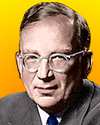 (source)
(source)
|
George Gamow
(4 Mar 1904 - 19 Aug 1968)
Russian-American nuclear physicist, cosmologist and writer who embraced the Big Bang Theory to explain the origin of the universe. Later in his career, he broadened his field of study into biochemistry, DNA and genetic theory.
|
Science Quotes by George Gamow (12 quotes)
Adam, the first man, didn’t know anything about the nucleus but Dr. George Gamow, visiting professor from George Washington University, pretends he does. He says for example that the nucleus is 0.00000000000003 feet in diameter. Nobody believes it, but that doesn't make any difference to him.
He also says that the nuclear energy contained in a pound of lithium is enough to run the United States Navy for a period of three years. But to get this energy you would have to heat a mixture of lithium and hydrogen up to 50,000,000 degrees Fahrenheit. If one has a little stove of this temperature installed at Stanford, it would burn everything alive within a radius of 10,000 miles and broil all the fish in the Pacific Ocean.
If you could go as fast as nuclear particles generally do, it wouldn’t take you more than one ten-thousandth of a second to go to Miller's where you could meet Gamow and get more details.
He also says that the nuclear energy contained in a pound of lithium is enough to run the United States Navy for a period of three years. But to get this energy you would have to heat a mixture of lithium and hydrogen up to 50,000,000 degrees Fahrenheit. If one has a little stove of this temperature installed at Stanford, it would burn everything alive within a radius of 10,000 miles and broil all the fish in the Pacific Ocean.
If you could go as fast as nuclear particles generally do, it wouldn’t take you more than one ten-thousandth of a second to go to Miller's where you could meet Gamow and get more details.
— George Gamow
'Gamow interviews Gamow' Stanford Daily, 25 Jun 1936. In Helge Kragh, Cosmology and Controversy: The Historica1 Development of Two Theories of the Universe (1996), 90.
As soon as matter took over, the force of Newtonian gravity, which represents one of the most important characteristics of “ponderable” matter, came into play.
— George Gamow
In Conclusion of The Creation of the Universe (1952, 2012), 136.
Dear Professor Rutherford, We students of our university physics club elect you our honorary president because you proved that atoms have balls.
— George Gamow
In Letter (10 Oct 1929) received from students in Rostow na Donu, USSR, asking Ernest Rutherford USSR to become honorary president of their physics club. As quoted in George Gamow, My World Line: An Informal Autobiography (1970), 77-78. Gamow explained to Rutherford that the phrases for atomic “nucleus” and “cannonball” shared the use of the word “iadro” in Russian. The students had made faulty use of their Russian-English dictionary, but they were aware of Rutherford’s gold foil experiment. [Peter Atkins may have repeated the anecdote somewhere, but he did not originate it, yet the quote is seen attributed to him around the Web. —Webmaster]
If and when all the laws governing physical phenomena are finally discovered, and all the empirical constants occurring in these laws are finally expressed through the four independent basic constants, we will be able to say that physical science has reached its end, that no excitement is left in further explorations, and that all that remains to a physicist is either tedious work on minor details or the self-educational study and adoration of the magnificence of the completed system. At that stage physical science will enter from the epoch of Columbus and Magellan into the epoch of the National Geographic Magazine!
— George Gamow
'Any Physics Tomorrow', Physics Today, January 1949, 2, 17.
If the expansion of the space of the universe is uniform in all directions, an observer located in anyone of the galaxies will see all other galaxies running away from him at velocities proportional to their distances from the observer.
— George Gamow
The Creation of the Universe (1952), 31.
It is well known that theoretical physicists cannot handle experimental equipment; it breaks whenever they touch it. Pauli was such a good theoretical physicist that something usually broke in the lab whenever he merely stepped across the threshold. A mysterious event that did not seem at first to be connected with Pauli's presence once occurred in Professor J. Franck's laboratory in Göttingen. Early one afternoon, without apparent cause, a complicated apparatus for the study of atomic phenomena collapsed. Franck wrote humorously about this to Pauli at his Zürich address and, after some delay, received an answer in an envelope with a Danish stamp. Pauli wrote that he had gone to visit Bohr and at the time of the mishap in Franck's laboratory his train was stopped for a few minutes at the Göttingen railroad station. You may believe this anecdote or not, but there are many other observations concerning the reality of the Pauli Effect!
— George Gamow
From Thirty Years That Shook Physics: The Story of Quantum Theory (1966), 64. Note the so-called Pauli Effect is merely anecdotal to provide humor about supposed parapsychology phenomena in coincidences involving Pauli; it should not be confused with scientifically significant Pauli Exclusion Principle.
It took less than an hour to make the atoms, a few hundred million years to make the stars and planets, but five billion years to make man!
— George Gamow
In The Creation of the Universe (1952), 139.
Much later, when I discussed the problem with Einstein, he remarked that the introduction of the cosmological term was the biggest blunder he ever made in his life. But this “blunder,” rejected by Einstein, is still sometimes used by cosmologists even today, and the cosmological constant denoted by the Greek letter Λ rears its ugly head again and again and again.
— George Gamow
My World Line (1970). Cited in Edward Robert Harrison, Cosmology: the Science of the Universe (2000), 379, which adds: “The Λ force is referred to by various names, such as the cosmological constant, cosmological term, cosmical constant or cosmical term.”
Radiant energy, which at the beginning [of the universe] played a predominant role in the evolutionary process, gradually lost its importance and by the end of the thirty-millionth year yielded its priority in favor of ordinary atomic matter.
— George Gamow
In The Creation of the Universe (1952, 2012), 136.
There was a young fellow from Trinity,
Who took the square root of infinity.
But the number of digits,
Gave him the fidgets;
He dropped Math and took up Divinity.
Who took the square root of infinity.
But the number of digits,
Gave him the fidgets;
He dropped Math and took up Divinity.
— George Gamow
Epigraph on title page of One, Two, Three… Infinity: Facts and Speculations of Science (1947, 1988), i. The original text shows symbols instead of the words which appear above as “square root of infinity.”
Twinkle, twinkle, quasi-star
Biggest puzzle from afar
How unlike the other ones
Brighter than a billion suns
Twinkle, twinkle, quasi-star
How I wonder what you are.
Biggest puzzle from afar
How unlike the other ones
Brighter than a billion suns
Twinkle, twinkle, quasi-star
How I wonder what you are.
— George Gamow
In Matter, Earth, and Sky (1965), 568. Quoted earlier in Newsweek (25 May 1964), 63, Pt 2, 63.
Whereas all humans have approximately the same life expectancy the life expectancy of stars varies as much as from that of a butterfly to that of an elephant.
— George Gamow
In A Star Called the Sun (1964), 145.
Quotes by others about George Gamow (2)
It is one of the striking generalizations of biochemistry—which surprisingly is hardly ever mentioned in the biochemical text-books—that the twenty amino acids and the four bases, are, with minor reservations, the same throughout Nature. As far as I am aware the presently accepted set of twenty amino acids was first drawn up by Watson and myself in the summer of 1953 in response to a letter of Gamow's.
'On the Genetic Code', Nobel Lecture, 11 December 1962. In Nobel Lectures: Physiology or Medicine 1942-1962 (1964), 811.
Dear Professor Rutherford, We students of our university physics club elect you our honorary president because you proved that atoms have balls.
In Letter (10 Oct 1929) received from students in Rostow na Donu, USSR, asking Ernest Rutherford USSR to become honorary president of their physics club. As quoted in George Gamow, My World Line: An Informal Autobiography (1970), 77-78. Gamow explained to Rutherford that the phrases for atomic “nucleus” and “cannonball” shared the use of the word “iadro” in Russian. The students had made faulty use of their Russian-English dictionary, but they were aware of Rutherford’s gold foil experiment. [Peter Atkins may have repeated the anecdote somewhere, but he did not originate it, yet the quote is seen attributed to him around the Web. —Webmaster]
See also:
- 4 Mar - short biography, births, deaths and events on date of Gamow's birth.
- George Gamow - context of quote “Five billion years to make man” - Medium image (500 x 250 px)
- George Gamow - context of quote “Five billion years to make man” - Large image (800 x 400 px)
- George Gamow - context of quote “Twinkle, twinkle, quasi-star” - Medium image (500 x 250 px)
- George Gamow - context of quote “Twinkle, twinkle, quasi-star” - Large image (800 x 400 px)
- Mr Tompkins in Paperback, by George Gamow. - book suggestion.
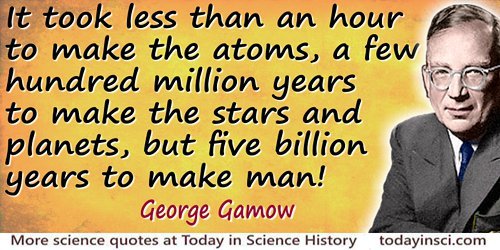
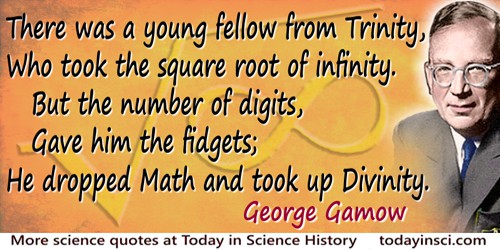
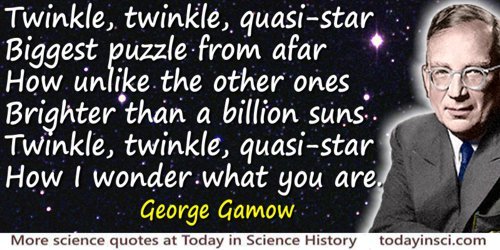
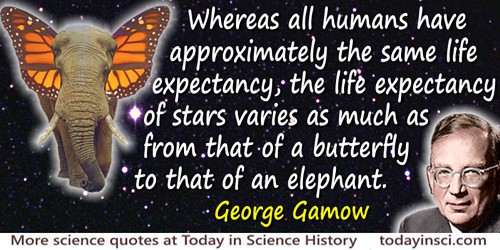
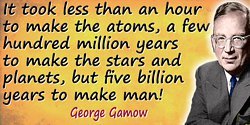
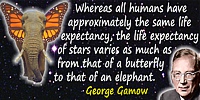
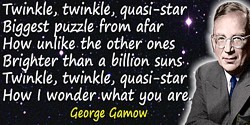
 In science it often happens that scientists say, 'You know that's a really good argument; my position is mistaken,' and then they would actually change their minds and you never hear that old view from them again. They really do it. It doesn't happen as often as it should, because scientists are human and change is sometimes painful. But it happens every day. I cannot recall the last time something like that happened in politics or religion.
(1987) --
In science it often happens that scientists say, 'You know that's a really good argument; my position is mistaken,' and then they would actually change their minds and you never hear that old view from them again. They really do it. It doesn't happen as often as it should, because scientists are human and change is sometimes painful. But it happens every day. I cannot recall the last time something like that happened in politics or religion.
(1987) -- 


